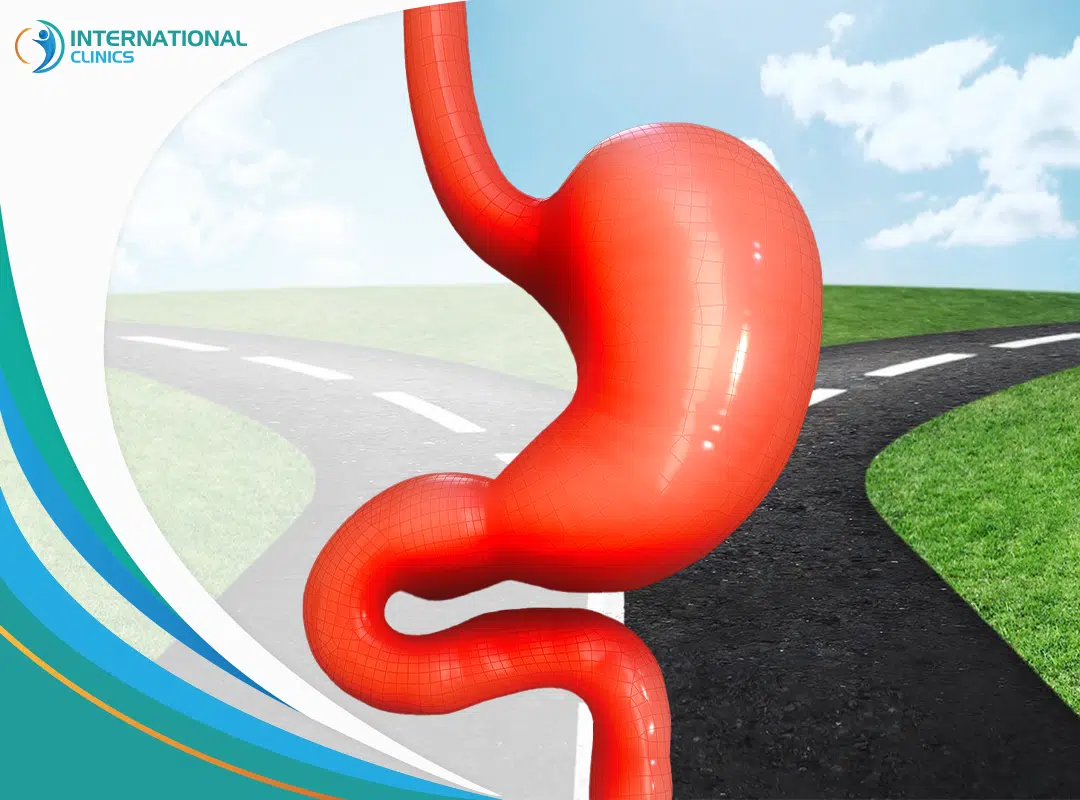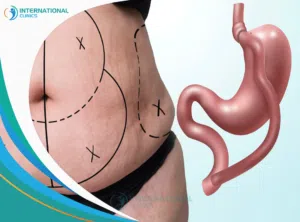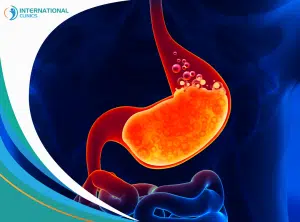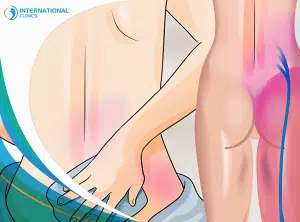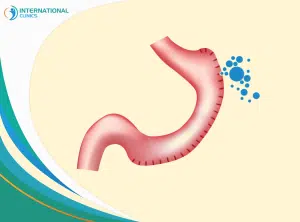Obviously, being an obese person puts you in a dangerous zone! Obesity is a chronic condition that has negative consequences on nearly every system in your body. Fortunately, in the last 3 decades, surgeons have started to perform surgery that has the potential to treat obesity and end the struggle of many people. Let’s introduce you to gastric bypass surgery!
Gastric bypass surgery, formally called roux-en-Y (spelled “roo-en-why”), is a type of weight loss surgery that alters how your body handles food by creating a small pouch from your stomach and connecting the new pouch directly to your small intestine. Interestingly, this surgery has become the most performed obesity procedure in the United States because it provides great weight loss with manageable side effects.
Do you have an obesity problem and want to solve it permanently? Contact us and our doctors will give you distinguished solutions..
Why Gastric Bypass Surgery Is Done?
Gastric bypass surgery is very effective and helpful for obese people. After the surgery, your stomach will be smaller, and you will feel full quickly after eating. This procedure is designed to help you shed excess weight and reduce your risk of developing serious weight-related health problems that could be life-threatening. Some of these health problems include heart disease, high blood pressure, high cholesterol, and obstructive sleep apnea.
But that’s not all! Gastric bypass surgery can also help reduce your risk of developing type 2 diabetes, stroke, cancer, and even infertility. In short, the surgery can grant you the following benefits:
- Lose excess weight by 60 to 80% in a very short period of time
- Limit how many calories and nutrients your body can absorb from food
- Limit the amount of food your stomach can keep or hold
- Feel fuller for a longer time and decrease your appetite
- Get long-lasting results and prevent obesity-related health problems
- Bring positive changes to your gut hormones and treat metabolic syndrome caused by obesity
- Be like celebrities, such as Sally Morgan and Randy Jackson, who underwent surgery before to fight obesity!
How Common Is Gastric Bypass Surgery?
Gastric bypass is one of the most well-known procedures to combat obesity. This surgery has been practiced, studied, and refined for over 50 years in all parts of the world, making it a trustworthy, effective option for those looking to lose weight and improve their health.
However, in recent years, the popularity of the gastric bypass procedure has witnessed a steady decline as other weight loss surgeries – such as the gastric sleeve – have become more popular. In fact, today, the gastric bypass represents only about 18% of all bariatric surgeries.

But that doesn’t mean that gastric bypass isn’t still a valuable tool for those struggling with obesity and related health conditions. In fact, for many patients, it can be a life-changing option that helps them achieve significant weight loss and improve their overall health and quality of life.
How Does Gastric Bypass Surgery Work?
Gastric bypass surgery is a multi-step process that involves reducing the functional part of your stomach to a small pouch, which is then separated from the rest of your stomach using surgical staples.
This restricts the amount of food that your stomach can hold, which is key to achieving long-term weight loss. The surgery also involves connecting the new stomach pouch to a lower segment of your small intestine. This means that when food passes through your digestive system, it bypasses most of your stomach and the first part of your small intestine.
Why is this important? Well, because of this bypass, your digestive system won’t absorb all the nutrients or calories in your food. This can help you achieve and maintain weight loss, as well as improve or even resolve certain health conditions associated with being overweight.
Of course, like any surgery, there are risks involved. Your doctor will carefully evaluate your overall health and medical history to determine if the gastric bypass is right for you.
Candidates for Gastric Bypass Surgery
Although gastric bypass surgery is a very successful kind of weight loss surgery, it is not the right choice for everyone. You should meet the following criteria to be eligible for this surgery:
- Very obese or have a body mass index (BMI) over 40
- Tried other means for weight loss, but without success
- Have health issues related to obesity, such as diabetes type 2 or hypertension
- Ready to follow the instructions and lifestyle changes before and after the surgery

Preparation for Gastric Bypass Surgery
As the case with all major surgery, you need to find a qualified and skilled surgeon who has enough experience performing obesity surgery. Often, they request additional testing and perform physical examinations to determine whether a gastric bypass is the best option for you. Your surgeon may also do the following:
- Determine the best type of gastric bypass surgery for you and the method of surgery (open or laparoscopic).
- Advise you to shower using antibacterial soap, particularly in the night or morning of the surgery.
- Instruct you to start a low-calorie liquid diet (water, protein shakes, etc.) about 1-4 weeks before the procedure.
- Advise you to arrange for a driver or someone to take you from the hospital to your house and remain with you for a few days after surgery.
- Instruct you to stop taking certain medications, such as ibuprofen and naproxen.
- Ask you to stop smoking at least three months before your surgery.
Steps of Gastric Bypass Surgery
Surgeons usually perform the surgery in a hospital under general anesthesia and need around 60 to 90 minutes to finish it. Currently, there are two main ways to perform the surgery, namely open surgery and laparoscopy.
Open surgery involves making a large incision in your abdomen to make the necessary changes. Laparoscopy, on the other hand, involves the use of a laparoscope (small camera) to navigate the abdomen and make the right moves. In either case, gastric bypass surgery commonly requires two main steps:
Shrinking the Stomach
To make your stomach smaller, your surgeon will divide your stomach into a smaller upper region and a bigger lower section by using surgical staples. So, the food will go into the upper part of your stomach, which now will be like a “pouch” the size of a big walnut. This pouch only can receive 28 grams of food.
Bypassing the Stomach & Intestines
The bypass refers to connecting a little portion of your small intestine (called the jejunum) to a tiny hole in the pouch (upper portion of the stomach). This new opening will allow the food to pass from the pouch into your small intestine directly; thus, absorbing fewer calories.
Recovery After Gastric Bypass Surgery
You’re more likely to spend 2-5 days in the hospital following this surgery. The recovery phase may involve:
- Expect to feel quite exhausted and tired, but you still need to do short walks around your house to promote recovery.
- Keep optimal wound care and prevent infection by following post-operative recommendations given by your surgeon.
- Eat soft and liquid foods after the surgery and move to solid meals after a few weeks. A dietician will provide you with the right advice regarding this important matter.
- Finally, you may need to take vitamin and mineral supplements to replace those that are typically absorbed in the “bypassed” sections of your digestive system.
What Can I Expect After Gastric Bypass Surgery?
To start, in the first month, you’ll only be able to consume small amounts of soft food and liquids. It’s a gradual process, but eventually, you’ll be able to reintroduce solid foods back into your diet. However, be prepared to feel full quickly after just two tablespoons of food.
Your physician may also recommend that you take nutritional supplements to ensure you’re getting all the necessary nutrients your body needs. In the first two years after the surgery, you can expect to shed one-half to two-thirds of your excess body weight. That’s a significant amount of weight! However, weight loss will continue for up to a year and a half before stabilizing.
the amount of weight you lose will depend on a variety of factors, including the type of surgery you undergo and the lifestyle changes you make post-surgery. But it’s not uncommon for patients to lose around 70% – or even more – of their excess weight within the first two years.
However, weight loss isn’t the only benefit of gastric bypass surgery. In fact, this procedure can also improve or even resolve several health conditions often associated with being overweight. These conditions include high blood pressure, gastroesophageal reflux disease, heart disease, high cholesterol, obstructive sleep apnea, type 2 diabetes, and infertility.
But it’s not just your physical health that can improve! Gastric bypass surgery can also enhance your ability to perform daily activities, which could have a positive impact on your overall quality of life.
Our medical team is ready to provide you with all the necessary information before the operation, with pictures of the results obtained by patients.
Risks of Gastric Bypass Surgery
Although generally safe and highly effective, gastric bypass surgery remains a major surgery that carries different risks and potential side effects, including:
- Dumping syndrome, which happens due to the quick moving of food passes from the stomach to the small intestine. This results in uncomfortable symptoms, such as diarrhea, nausea, and fainting.
- Stomach expansion to its original size
- Breakdown of surgical staples or stomach perforation
- Vitamin and mineral deficiencies
- Intestinal stenosis
- Gallstones formation
- Stomach ulcers
- Bowel obstruction
Long-Term Complications of Gastric Bypass Surgery
Modifying your digestive system through surgery can lead to various digestive complications. Here are some of them:
- Weight regain
It’s possible to stretch out your stomach again if you don’t commit to changing the way you eat after surgery. Even the small pouch created by your surgeon can grow over time, allowing you to hold more food. If this happens, gastric bypass revision surgery is an option.
- Dumping syndrome
This is a condition where your stomach empties its contents too fast into the small intestine. Unfortunately, nearly 50% of people who undergo bariatric surgery may experience some symptoms of dumping syndrome. These symptoms can include nausea, diarrhea, abdominal cramping, and hypoglycemia.
- Malnutrition
Gastric bypass surgery intentionally causes malabsorption in your small intestine to reduce the calories you absorb, but it can also result in nutritional deficiencies if you’re not careful. Your healthcare provider will prescribe nutritional supplements to prevent this.
- Bile reflux
A surgery such as gastric bypass that affects and leads to malfunction of the pyloric valve (the opening between your stomach and small intestine). If the pyloric valve doesn’t close properly, bile from your gallbladder can backwash into your stomach, causing bile reflux. This condition can lead to gastritis and stomach ulcers if left untreated.
- Ulcers
People who have had gastric bypass surgery are at a higher risk of developing ulcers in their stomach or duodenum. Your healthcare provider may advise you to avoid smoking or using NSAIDs (non-steroidal anti-inflammatory drugs) in the future to prevent ulcers.
- Gallstones
Rapid weight loss sends a large amount of cholesterol to your liver for processing. This cholesterol can build up in your gallbladder, leading to the formation of cholesterol gallstones.
Diet After Gastric Bypass Surgery
Following gastric bypass surgery, you will have to strictly follow certain dietary guidelines for several months. These guidelines are necessary to allow your digestive system to heal while ensuring you get the nutrients you need while taking in less food overall.
Initially, you will likely start on a liquid diet for several weeks before gradually progressing to a soft diet for a few more weeks. It may take two to three months before you are ready to return to solid foods. Your healthcare team will provide you with more specific dietary guidelines, which usually include:
- Take vitamin and mineral supplements
You will need to take micronutrient supplements for the rest of your life as your digestive system will no longer absorb enough of them from food alone.
- Consume fluids
Hydration is critical after surgery to avoid unpleasant side effects, such as nausea and constipation. This can be challenging, however, due to your reduced stomach size, and you’ll be advised not to drink while eating.
- Consume protein
Protein is the most important macronutrient to stay strong after surgery and prevent muscle loss. Focusing on protein sources will help you get more out of the calories you consume and avoid less nutritious choices.
- Avoid foods high in sugar and starch
Sugars entering your small intestine can cause uncomfortable side effects, such as indigestion and rapid blood sugar changes, due to how quickly food passes from your stomach to your small intestine.
Variations & Techniques of Gastric Bypass
Gastric bypass is often done laparoscopically, which involves making several small incisions, also known as ports. One of the ports is used to insert a surgical telescope that’s connected to a video camera, while the others permit access to specialized operating instruments.
This technique is also referred to as limited access surgery due to the limitations on handling and feeling tissues, as well as the limited resolution and two-dimensionality of the video image displayed on a screen. However, an experienced, skilled laparoscopic surgeon can perform most procedures as quickly as with an open incision and can switch to an incision if needed. The variations and subtypes of gastric bypass include:
Gastric bypass surgery comes in different types and variants, and each one has its unique features and effects on the patient’s health. Here are the four different types of gastric bypass surgery and how they work:
Proximal Gastric Bypass
- One of the most common types of gastric bypass surgery is the proximal Roux-en-Y. In this procedure, the small intestine is divided approximately 18 in (45 cm) below the lower stomach outlet, and it is re-arranged into a Y-configuration.
- This configuration allows food to flow out of the small upper stomach pouch. Traditionally, patients experience a very rapid onset of the stomach feeling full, followed by growing satiety shortly after the start of a meal.
Distal Gastric Bypass
In this type of gastric bypass surgery, the Y-connection is moved further down the gastrointestinal tract, usually 39–59 in (100–150 cm) from the lower end of the small intestine. This configuration causes reduced absorption of food, primarily fats and starches, as well as various minerals and fat-soluble vitamins. The unabsorbed fats and starches pass into the large intestine, where bacterial actions may act on them to produce irritants and malodorous gases. These larger effects on nutrition are traded for a relatively modest increase in total weight loss.
Mini-Gastric Bypass
The mini-gastric bypass procedure is a new modification of the standard procedure. In this procedure, a long narrow tube of the stomach is created along its right border of the stomach. Then, a loop of the small gut is brought up and hooked to this tube at about 180 cm from the start of the intestine. This type of surgery is becoming more and more popular because of its low risk of complications and good sustained weight loss.
Endoscopic Duodenal-Jejunal Bypass
This technique involves the implantation of a duodenal-jejunal bypass liner between the beginning of the duodenum and the mid-jejunum. The bypass liner prevents partially digested food from entering the first and initial part of the secondary stage of the small intestine.
Cost of Gastric Bypass
The cost of gastric bypass varies widely based on the country, surgical method, surgeon, and hospital. In Turkey, the surgery costs between 3900-4500 US dollars.
In the United States, Gastric Bypass surgery costs on average about 24,000 US dollars. However, the cost varies by state, ranging from an average of $15,000 in Arkansas to an average of $57,000 in Alaska. In Germany, it can cost up to 15,000 EURO.
Difference Between Gastric Bypass & Gastric Sleeve
Because they’re similar, you may be confused between gastric bypass and gastric sleeve. Check the following table to learn the main differences between the two procedures:
| Gastric Bypass | Gastric Sleeve | |
| Goals | Your surgeon makes your stomach smaller by turning it into a small pouch and bypassing most of it and the first part of your small intestine | Your surgeon removes about 80% of your stomach and sews the remaining part |
| Complexity | two-step procedure (more complicated) with longer recovery | one-step procedure (less complicated) with faster recovery |
| Results | Lose up to 80% of your excess body weight at a faster pace | Lose up to 65 % of your excess body weight at a slower pace |
| Risks | More risk of complications, especially malabsorption of nutrients | Lower risk of complications, including dumping syndrome, but can cause acid reflux |
| Anatomical Changes | Possible to be reversed but remains a challenging task | Permanent and can’t be reversed |
Click here to learn more about: Gastric Bypass Surgery in Turkey.
Frequently Asked Questions (FAQ)
The weight loss after gastric sleeve can be dramatic, with an average of around 70% of excess weight lost during this time. Although some patients may regain some weight over time, on average, patients who undergo gastric bypass surgery can expect to lose about 50% of their excess weight in the long term.
Gastric bypass surgery is a serious medical procedure that can provide life-changing benefits for those struggling with obesity and related health conditions. However, as with any major surgery, there are risks and considerations that should be carefully weighed before making a decision.
These changes can help you manage conditions such as high blood sugar, high blood pressure, obesity, hyperglycemia, hyperlipidemia, heart disease, diabetes, gastroesophageal reflux, fatty liver disease, sleep apnea, and osteoarthritis.
The procedure typically takes between two to four hours and involves creating a small stomach pouch and rerouting the intestines to this new pouch. After the surgery, the patient will need to stay in the hospital for a few days, typically two.
Gastric bypass surgery is a major procedure that requires a significant amount of recovery time. After the surgery, you’ll typically spend a day recovering in the hospital. Once you’re discharged, you’ll need to spend several weeks recovering at home before you feel ready to return to work.
As your body recovers from gastric bypass surgery, you may experience a range of side effects. Firstly, you may feel fatigued and witness changes in your weight. Some may also experience hormone imbalances and mood changes.
Gastric bypass surgery is a major surgery and some level of pain is to be expected. However, the amount of pain you experience will depend on your individual pain tolerance and the specifics of your surgery.
How International Clinics Can Help You?
International Clinics offers special packages for international patients who seek cheap and safe gastric bypass surgery in Turkey. If you are concerned about your weight and seek effective solutions, we’re here to help you and answer all your questions.
Our surgeons and medical personnel have performed thousands of successful gastric bypass surgery for women and men from Europe, North America, and the Middle East.
Use the Contact Us Fourms or Whatsapp button below to get a free medical consultation right now!
